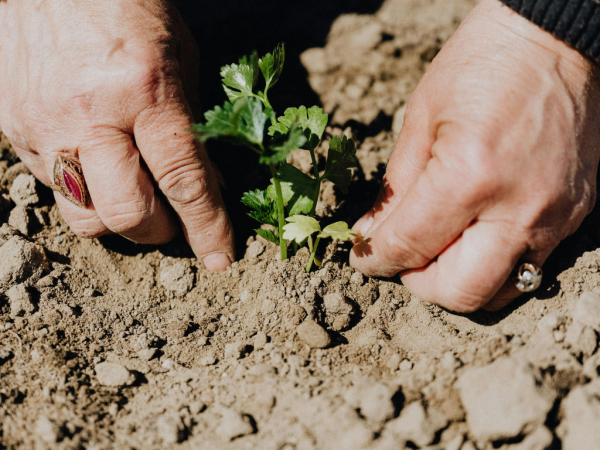Full of beans: toddler nutrition
When it’s time for your toddler’s first foods, you want the very best nutrition for their development. A plant-based approach is a proven recipe for success!

The right nutrition is the best way to set your little one up for lifelong good health, and a vibrant plant-based diet is hands-down the most nutrient-rich way to feed your growing child. As a parent, you may sometimes feel scrutinised – or even criticised – for saying ‘thanks, but no thanks’ to the standard Western diet for your child, but you can be confident in the knowledge that your plant-based choice is backed by an enormous body of evidence.
In fact, the largest association of dietitians in the world, the American Academy of Nutrition and Dietetics, supports vegan and vegetarian diets for all life stages, as does the Dietitians Association of Australia, provided they are appropriately planned. Renowned paediatrician Dr Benjamin Spock also recommended a fully plant-based diet in the final edition of his bestselling book, Baby and Child Care, acknowledging the growing research supporting this.
As a parent, being informed about plant-based nutrition is important as this will provide reassurance that you are doing the best for your child. In my experience, infants raised on plant-based diets grow into healthy, strong adults and typically experience less childhood illness than their peers who are fed a standard Western diet. Let’s look at what you need to know to ensure your tot is full of beans and thriving on good nutrition from birth into childhood.
From birth to first foods
From birth until around six months of age, all your child will need is breast milk, or a suitable plant-based alternative if you are unable to breastfeed. Breast milk is nature’s perfect food! For breastfeeding mums, excluding animal foods reduces toxic residues in breast milk, while eating a vibrant wholefood, plant-based diet provides key nutrients for both mum and baby, from A to Zinc.
A healthy plant-based diet for mum also increases the chances that the baby will enjoy a range of plant foods when it’s time to start on solid foods.
You can start introducing solid foods when your baby can sit in a highchair with good head control. They’ll be able to grab things to put in their mouth and will have started showing an interest in food. For the best start in life, I strongly recommend only offering your child plant-based foods when they are ready to start eating solid foods.
It’s important to avoid any foods that could cause choking, so make sure first foods are soft enough or otherwise are mashed or pureed to eliminate any risk. For new parents, it’s a good idea to complete an infant first aid course to ensure you are aware of the risks and appropriate responses in case something does go wrong.
A taste for healthy
I encourage introducing a wide variety of plant foods to your child, including all types of vegetables and fruits, legumes, whole grains, nuts and seeds (in appropriate forms to avoid choking risks). This is not only good for their nutrition, but also for their gut microbiome and for their future openness to eating a wide range of foods.
As with all ages, foods with added salt, sugar or oil are not advised, and steering clear from the outset means your little one won’t develop a taste for these unhealthy additives. Whole grains are a healthier choice than refined grains and are a good source of iron for your growing tot. You might try oats eaten as porridge, brown rice, well-cooked millet or amaranth, or wholemeal bread – aiming for low sodium in your choices.
When you are introducing new foods, don’t stress about how much is eaten. At this stage, your baby is exploring unfamiliar tastes and textures. They will want to touch, smell, and play with new foods but not necessarily taste or gobble them up them straight away. Start with one new solid food every few days and watch for any signs of allergic reaction. This applies to any solids, whether plant or animal in origin.
If your child rejects the new food, accept this and try introducing it again later. It can take a dozen or more exposures before they are ready to eat something different. Eating should be fun, so there’s no need for power struggles or to otherwise fall into the trap of using unhealthy sweets as a reward. If they reject a food, perhaps show your child that you will eat it yourself. Modelling healthy eating behaviours is so important because children will notice what you eat.
Prevention over cure
Powering your toddler up on a wholefood plant-based diet means you are protecting them from myriad risks associated with the standard Western diet. The standard diet is high in animal and processed foods that are nutrient-poor but high in salt, fat, and refined sugars and starches. Studies have shown that 100 percent of children raised this way have visible signs of heart disease by age 10!

I strongly recommend against feeding your toddler any dairy products. The cows’ milk these products are made from is designed for baby cows, containing powerful hormones that help a small calf grow from 30 kilograms to 300 kilograms in just two years! In human babies, cows’ milk can be the cause of colic and reflux, iron deficiency, constipation, eczema, and rashes. There is some evidence that it may also be a trigger leading to type 1 diabetes in those with genetic susceptibility.
Dairy is strongly linked to the development of chronic disease later in life, including heart disease, many types of cancer, osteoporosis, inflammatory bowel diseases, acne, migraines, and obesity. Soy foods, on the other hand, including soybeans, soy milk, tofu, and tempeh are good foods for toddlers. Evidence shows that soy consumed during childhood can reduce cancer risk in later years by up to 60 percent.
Powering your toddler up on a wholefood plant-based diet means you are protecting them from myriad risks associated with the standard Western diet.
Nutrients that nurture
It is vital that you supplement your plant-based toddler with vitamin B12. I recommend a low-dose chewable B12 supplement or a spray in the cyanocobalamin form, given every other day (you can crush the chewables into
food). It’s time to start supplementing once solid foods start to substantially displace breast milk or fortified formulas. Low B12 levels can be catastrophic in toddlers and adults, so ensure both you and your child have your levels tested once every year.

Iron is important for growing toddlers to enable oxygen transport throughout the body and to support normal growth and cognitive function. Iron-rich foods include iron-fortified wholegrain cereals, leafy greens, beans, lentils, and sprouted whole grains. Vitamin C-rich foods can increase iron absorption up to five-fold, so add citrus, capsicums, berries, brassicas, and tomatoes in abundance! Foods from the onion and garlic family also facilitate iron absorption, so are another good inclusion.
Vitamin D is important for growth and bones. The best way to meet your child’s needs is to make sure they get 20 minutes of sunshine on their forearms and face each day, and longer if your toddler has darker skin. If this isn’t possible, then supplements or fortified foods are a good idea.
To ensure adequate omega-3 fatty acid intake, include dark leafy greens, ground flaxseeds, chia seeds, hemp seeds and walnuts. At the same time, minimise omega-6 rich foods such as oils and processed foods because these impede the conversion of omega-3 fatty acids into the longer forms needed for healthy brain development.
Iodine levels can be a concern in toddlers and adding iodised salt isn’t the best solution due to the sodium it delivers. Seaweeds are a good source of iodine, especially dulse, wakame, and nori (many toddler’s just love an avocado nori roll!). Kelp should be avoided because its iodine content is too high. You may consider an appropriate iodine supplement if iodine intake is a concern.
While breast milk is a major source of calcium before solid foods are introduced, plant foods such as beans and greens are rich in calcium, so be sure to include these in your toddler’s diet.
Making whole plant foods the cornerstone of your diet will provide your body with an array of micronutrients, which all work together to meet your nutritional needs.
Growing good eaters
Toddlers and young children have high energy needs but small stomachs, so aim to offer food every two to three hours. Include energy-dense starchy foods such as whole grains, potatoes, lentils, and beans as well as nutritious plant-foods with a naturally high fat content, such as avocado, nuts, and seeds (always taking care to avoid whole nuts due to choking risk).
Toddlers need to learn to chew solids, but smoothies can be a great way to help them eat their greens and other vegetables and fruits. You can also include dates, flaxseed, hemp or chia seeds, and nuts for an energy-packed meal or snack. Other healthy, satisfying snacks could include hummus with carrot sticks, pieces of cooked potato, pumpkin or broccoli, and wholemeal toast.
If organic foods are affordable and available, these are a good choice for your toddler. However, it’s more important to focus on introducing a range of nutritious plant foods to your child. Setting them up with good eating habits early also sets them up for good health throughout their lifetime. A plant-based diet is wonderfully health promoting for baby… and you!
This article is republished with permission from nourishmagazine.com.au.





